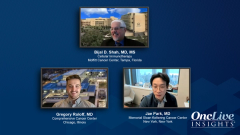
Opinion|Videos|February 16, 2024
Optimal Sequencing of Therapy for Previously Treated Patients With Relapsed or Refractory ALL
Dr. Shah and colleagues dissect the social determinants of health, including limited personal resources, frailty, distance to treatment facilities, therapeutic compliance, and other considerations that impact effective treatment sequencing for patients with relapsed or refractory ALL, including access to care and CAR-T cell availability.
Advertisement
Episodes in this series

Advertisement
Latest CME
Advertisement
Advertisement
Trending on OncLive
1
Long-Term Cilta-Cel Data Show Low Rates of PFS Events in Standard-Risk R/R Myeloma
2
Real-World Data Support Clinical Benefit With Lifileucel in Previously Treated Advanced Melanoma
3
FDA Updates Axi-Cel Label to Remove Limitation of Use in R/R PCNSL
4
Dr Riedell on the Long-Term Efficacy of Tisa-Cel in R/R Follicular Lymphoma
5





































